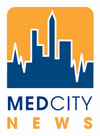
Molecular imaging company Enlyton Ltd. is seeking a $3 million investment to get its cancer-detection technology into clinical studies.
The Columbus, Ohio-based company believes its targeting agent, an antibody called ATA-1, is better than the industry standard at marking cancerous tumors in medical imaging scans.
If the company’s faith in its technology is well-placed, CEO Jeff Bergen’s projection of $1 billion in annual per-dose sales could someday come to fruition, making Enlyton an attractive acquisition target for diagnostics and imaging companies.
But that’s a long way off. First, the company needs to run human imaging studies on its antibody, a radiopharmaceutical that’s injected before undergoing scans. Before the company can initiate the study, it’ll have to ramp up production of the antibody — a manufacturing process that takes about a year, according to Bergen.
Neither of those moves will be cheap, and Enlyton will need more than the $2 million it’s raised in cash and in-kind contributions since it started in 2004, so the company is in discussions with venture capitalists.
Finding VC money is Ohio is tough, Bergen admitted, since most investors are more comfortable in the medical device space. (Devices accounted for 22 percent of all venture dollars to Ohio companies last year, with biotechnology accounting for just 11 percent, according to the National Venture Capital Assn..)
If Enlyton is going to convince VCs to fork over their cash, the strength of the company’s technology will be among the deciding factors. The company got its start when founder Dr. Edward Martin Jr. licensed a portfolio of antibodies from the National Institutes of Health. Martin, a surgery professor at Ohio State University, had been working with the NIH since the 1980s on projects involving TAG-72 antigen, a substance found on the surface of many cancer cells.
Enlyton’s ATA-1 antibody is designed to bind to TAG-72 rather than normal tissue, making cancerous tumors more visible to oncologists and radiologists. Standard scanners rely on an agent called FDG that targets glucose (cancerous tumors process large amounts of sugar). The problem is that non-cancerous organs also constantly process smaller amounts of glucose, which can lead to a lack of precision in medical images — a “background effect,” as Bergen calls it. The reliance on F-FDG also leads to false positives and difficulty in detecting smaller tumors, he said.
“The advantage we have is that our antibody is cancer-specific,” Bergen said.
It’s recognized within the industry that today’s imaging technology isn’t all it could be, according to Dr. Robert Ferguson, radiology department chairman at Cleveland’s MetroHealth System. That’s why so many companies like Enlyton are trying to make strides in the field of molecular imaging, Ferguson said.
“The promise lies in greater specificity in identifying particular pathologies,” he said.
Initially, Enlyton plans to target the imaging market for colorectal, pancreatic, gastric, esophageal and lung cancer. Later the company hopes to sell its antibody for intraoperative detection of cancer. In that application, surgeons would use a hand-held probe to scan for the antibodies during procedures.
Although Enlyton’s antibody hasn’t been tested yet in human imaging studies, it has been injected into humans in two studies, which showed that the substance is well-tolerated. If Enlyton can successfully complete a clinical imaging trial, Bergen expects to get significant attention from imaging and diagnostics companies.

